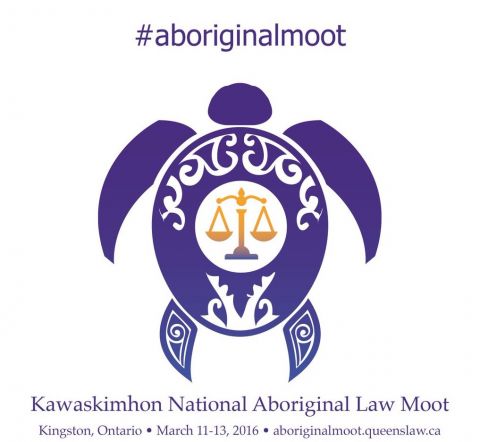
For over 20 years, the Kawaskimhon Moot has been a distinct presence on the Canadian mooting landscape. Mooting, a key part of the law school experience, offers a wide range of options for students: business law, environmental law, treaties, criminal justice – but only the Kawaskimhon moot features a specific focus on Indigenous issues.
With Queen’s hosting the event in early 2016, organizer and instructor Hugo Choquette is excited by the challenge of bringing it all together. “I’ve had a really enthusiastic response from everyone and have been very impressed by how quickly people have gotten on board,” he says. “It’s a very unique event, very distinct from other moots people get involved with.”
What sets the Kawaskimhon Moot apart, Choquette says, is a foundation based on collaboration instead of confrontation, a difference that affects every aspect of the moot – including the choice of venue. “One of the challenges in finding the right space is that this is a very egalitarian event,” he explains. “It’s better if you have a flat space: both the formal opening and closing ceremonies are based around large circles involving all participants, while negotiation circles tend to be smaller and a little less formal. Both types of circle maintain an egalitarian aspect and are held according to indigenous customs.” The space also has to accommodate substantial groups: “With all of Canada’s English-speaking law schools sending at least two team members, and sometimes three or four, plus coaches, elders, and community members, it can be a sizeable group.”
The egalitarian spirit of the opening ceremonies sets the tone for the entire moot experience. “It’s very inclusive – even though it’s listed as a competitive moot, that’s a bit of a misnomer,” Choquette says. “It’s about building both skills and understanding.”
These skills are built at tables where students – usually representing government, on one side, and First Nations on another – are presented with a common problem and asked to draft positions for evaluation and negotiation. “The interesting thing about this moot is that there’s no awards, no winning, it’s about building a consensus,” Choquette says. “Most of the time that doesn’t happen, which is very realistic, it doesn’t happen in real life either.” The true value, he explains, is in the experience and the perspectives that students gain. “On the one hand you have students learning lawyering skills and how to represent clients; if you are a student representing First Nations, learning how to address the government, negotiate with them, and vice versa for the students representing the government.
“But another part of it is understanding how traditional Indigenous principles and views interact with Canadian law,” Choquette continues. “Our clients tell us this is what their belief systems are, what their viewpoints are, and this is what they want, but these are things that don’t always fit into the framework of Canadian law, and you have to wrestle with that.”
The strong mix of Aboriginal and non-Aboriginal students at the moot also provides opportunities for students in both groups to explore new perspectives. “It’s happened before that students from the First Nations were representing government, which may be contrary to views they normally want to articulate, they’re representing the ‘other side’ in issues that are sometimes very real to them,” Choquette says. “And for non-Indigenous students to represent an Indigenous group and having to say ‘we know the law and we’re good at that, but what we’re not as good at is understanding these clients’ needs and viewpoints,’ – it forces them into a different mold.”
In the spirit of the moot, growth – not ‘winning’ – is the key goal. “I often tell my students even if you don’t achieve what you wanted in a negotiation, it’s the experience that counts,” Choquette says. “Students also get to meet people that are knowledgeable in these issues across Canada; the coaches are leading Aboriginal scholars from across Canada. You also get the experience of being immersed in Aboriginal customs and cultures. You have the elders there, directing things, something that students wouldn’t normally find in law school.”
With planning and problem creation – another collaborative project, this time between Choquette, other faculty, community members, and even his former students – underway, Choquette is looking forward to next year’s opportunity to host. “With the recent Truth and Reconciliation Commission report, this is an exciting time to be examining these issues,” he says. “I look forward to being part of that national conversation, and helping provide a venue for it.”